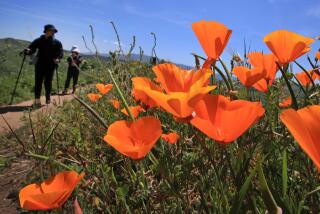Would Pilgrims Call This Progress?
- Share via
Thanksgiving being a day away, I wonder how Pilgrims who thanked God for guiding them through persecution, sickness and danger would have reacted to news that their descendants at the end of the 20th century would give thanks for a pill to cure baldness.
Is there any doubt that the Plymouth colonists would have broken out the cider, tossed babies in the air and scheduled an impromptu quilting bee, certain that 20th century man must have eliminated warfare, disease and repression?
“Sure, now on to baldness!” Miles Standish would have cried. “Then, in order, the other great problems: obesity and impotence!”
Well, Pilgrims, that’s where we are today as we close in on the 21st century. According to researchers, we’re about to make major pharmaceutical breakthroughs against hair loss, impotence and heaviness. This follows up on other advances through the years against corns, undesirable hair color and short fingernails.
We have come so very far.
To review just how far, I boned up on my knowledge of the Pilgrims, who set sail from England on the Mayflower in 1620. Many people today will wonder how a Mayflower van crossed the Atlantic Ocean, but we can’t take time to clear up their confusion right now.
Most of the Pilgrims had separated from the Church of England, risking arrest and imprisonment for doing so. They were persecuted to such an extent that they fled England for the Netherlands, but eventually decided that a brand new land would be their best bet. Leaving their culture and heritage behind, 102 people set off for the virgin territory across the Atlantic, unsure of what lay ahead.
The trip, often in dangerous waters, took more than two months. Eventually, in December of 1620, they settled at Plymouth in what is now Massachusetts. The site had been an Indian village until smallpox wiped it out in 1617.
The Pilgrims’ first winter was a killer, but they were willing to sacrifice. Poor food, not to mention a shortage of it, backbreaking work and brutal weather led to sickness in the colony. During the first winter, about half the Plymouth colonists died.
One day in their first spring, in 1621, an Indian walked into the colony and began the relationship that would eventually lead to the first Thanksgiving months later. Thankful for the bounty of their first harvest, the colonists invited the Indians to join them for a three-day festival.
The festival has become Thanksgiving, one of our most cherished holidays. It has come to celebrate the Pilgrims’ ability to withstand severe hardship and, drawing on their religious faith and personal courage, to forge part of early America. We also use it to celebrate the cooperation and trust with the Indians, but we all know how that story eventually ended.
The encyclopedia I used as my reference book had this to say about the Pilgrims: “Their bravery set an example for future generations of Americans.”
The whole history of this country, any country, should be about improving the lot for one’s descendants. The early colonists suffered mightily and had a much more fatalistic outlook toward life than we do today. Unlike us, they didn’t have to look too far for true dangers.
After that first year, when mere survival was considered a godsend, they gave thanks.
What about this Thanksgiving season? Adjusting for 376 years of civilization since the first one, what should we give thanks for?
Do we give thanks for having food on the table, or for having two cars in the garage?
Do we give thanks for eradicating disease, or for pills to grow hair?
Do we give thanks for the effort of those still struggling to make it, or for ways to keep them down?
Do we give thanks for religious freedom, or for those who want to impose their beliefs on others?
Do we give thanks for having eliminated war, or for the firepower that still allows us to wage it?
Do we give thanks for the richness of our souls, or for the dependability of our technology?
The Pilgrims had no trouble deciding what to be thankful for. Just being alive made their Thanksgiving meditations rather easy.
I suspect there would be some Pilgrim puzzlement about what makes us thankful today. They would no doubt marvel at society’s bounty, but eventually they’d ask tough questions about whether we’ve done all we could with the last 400 years.
In this Thanksgiving week, exactly how would we answer them?
*
Dana Parsons’ column appears Wednesday, Friday and Sunday. Readers may reach Parsons by calling (714) 966-7821, by writing to him at The Times Orange County Edition, 1375 Sunflower Ave., Costa Mesa, CA 92626, or by e-mail at dana.parsons@latimes.com.
More to Read
Sign up for The Wild
We’ll help you find the best places to hike, bike and run, as well as the perfect silent spots for meditation and yoga.
You may occasionally receive promotional content from the Los Angeles Times.






